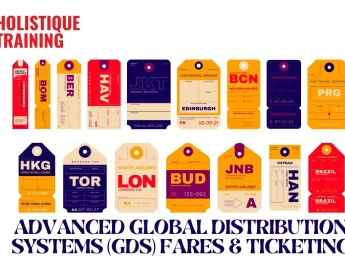Mastering the intricate facets of fare construction and ticketing using Global Distribution Systems (GDS) can be complex. Many rules and regulations differ depending on the global location and event or travel type.
Global Distribution Systems are the foundational infrastructure of the travel industry. Whether you are an experienced travel professional or are just entering the captivating domain of fares and ticketing, this course has been meticulously crafted to provide you with the essential skills and knowledge required to navigate the intricacies of GDS adeptly.
Customised for individuals possessing fundamental GDS familiarity, it’s essential to delve into the top GDS systems, including Sbare, Galileo, and Amadeus, to ensure you have the right functionality for the business and are also fully accessible to your clientele.
As a seller, you will also need to understand the various pricing elements, practicalities, and ticketing diversities that are essential to setting and selling fare types for each individual event. An in-depth understanding of your target market is also essential to help you develop the right tools and techniques to ensure and monitor ongoing success.
Upon completion of this course, participants will be able to:
- Assess GDS displays of mileage system pricing.
- Recognise and determine the cost of various journey types.
- Comprehend, interpret, and apply mileage and routing fare regulations.
- Grasp the significance of global indicators.
- Familiarise oneself with fare rules and airfare taxes.
- Proficiently apply all checks related to minimum fare rules.
- Know when and how to incorporate side trips.
- Understand the process of adding a manual fare to a GDS booking file.
- Skillfully utilise the IATA/UFTAA Fare Formula for accurate journey pricing.
- Be acquainted with using a GDS to issue tickets in manually-priced reservations.
- Have a comprehensive understanding of each field in an ATB ticket.
- Understand the application of the Lowest Combination Factor.
- Be capable of constructing and comprehending a linear fare construction.
This course is designed for anyone who is responsible for ticket sales and distribution or is required to manage and monitor new technologies for the sale and global distribution of tickets and fares. It would be most beneficial for:
- Customer Service Advisers
- Travel Agents
- Global Distribution Business Owners
- Airline Ticket Sales Agents
- Outsourced Agents
- Booking Agents
- WCAG Assessors
- BPO Agents
This course uses a variety of adult learning styles to aid full understanding and comprehension. Participants will discover the most important things required for a global distribution system. They will conduct group discussions based on pain points and beneficial areas of existing systems and share experiences based on home-built systems.
As a group, they will identify the best customer journey and eliminate areas of accessibility to increase diversity of the system. They will also review a trainer-led presentation based on statistical elements showing the success of each type of GDS system to identify the essential features for each area of ticketing.
Day 5 of each course is reserved for a Q&A session, which may occur off-site. For 10-day courses, this also applies to day 10
Section 1: Introduction to Mileage Based Fares
- Understanding mileage-based fares.
- Historical evolution of mileage-based fares in transportation.
- Benefits and challenges of implementing mileage-based fares.
- Comparison with traditional fare systems.
- Technology and infrastructure requirements for mileage-based fares.
- Policy and regulatory considerations in mileage-based pricing.
Section 2: Single Journey Pricing
- Case studies: successful implementations of mileage-based fares in single journeys.
- Environmental impact and sustainability in mileage-based pricing based on a single fare.
- Equity and social implications of mileage-based fares for a single journey in comparison to a return.
- Public perception and acceptance of mileage-based pricing.
- Future trends and innovations in mileage-based fares.
- Legal and ethical considerations in mileage-based pricing.
Section 3: Accessibility in Your System
- Practical applications: integrating mileage-based fares in different modes of transportation.
- Emerging technologies: blockchain, AI, and IoT in mileage-based fares.
- Stakeholder engagement and communication strategies in implementing mileage-based fares.
- WCAG and accessibility based systems.
- Customer journey considerations.
Section 4: Travel & Fare Limitations
- Challenges and solutions in implementing mileage-based fares at scale.
- Types of travel and fare restrictions.
- Regulatory framework and legal and compliance aspects.
- Understanding fare caps and ceilings.
- Geographic and route-based limitations.
- Time-based fare constraints including peak hours and off-peak hours.
- Fare limitations in different modes of transportation (e.g., air travel, public transit, ride-sharing).
Section 5: Circular Trips & Alternative Services
- Economic analysis: cost-benefit assessment of mileage-based pricing.
- Impact of travel and fare restrictions on consumer behaviour
- Financial implications for transportation providers and consumers.
- Social and equity considerations in the design of fare limitations and how to recommend alternatives.
- Providing real-time adjustments.
Section 6: Minimum Checks & Long-Haul Journeys
- International perspectives on mileage-based fares.
- Maintenance and safety checks for extended journeys.
- Responsibilities and checklists for long-haul trips.
- Understanding legal and safety standards for long-distance travel.
- Technology and tools for efficient minimum checks.
Upon successful completion of this training course, delegates will be awarded a Holistique Training Certificate of Completion. For those who attend and complete the online training course, a Holistique Training e-Certificate will be provided.
Holistique Training Certificates are accredited by the British Assessment Council (BAC) and The CPD Certification Service (CPD), and are certified under ISO 9001, ISO 21001, and ISO 29993 standards.
CPD credits for this course are granted by our Certificates and will be reflected on the Holistique Training Certificate of Completion. In accordance with the standards of The CPD Certification Service, one CPD credit is awarded per hour of course attendance. A maximum of 50 CPD credits can be claimed for any single course we currently offer.
- Course Code IND03-110
- Course Format Classroom, Online,
- Duration 5 days














